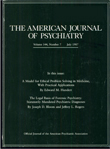TO THE EDITOR: In four of 12 prepubertal autistic children (6–10 years old) in our inpatient child psychiatry department, we have observed precocious secondary sexual characteristics (growth of pubic hair, increase of testis volume) that suggest high androgenic activity in infantile autism. In addition, there are four times more male than female autistic patients (
1). These observations are consistent with Geschwind and Galaburda's theory (
2): excess testosterone in the fetus may cause anomalies in the development of the left hemisphere, which in turn provoke cognitive dysfunction such as that found in subjects with autism.
To test our hypothesis of a hyperandrogeny and autism association, we measured plasma testosterone and adrenal androgen in nine drug-free inpatients with DSM-IV autism and 62 normal subjects of same age, sex, weight (within 2 kg), and stage of puberty. Written informed parental consent was obtained for all subjects. The autistic group consisted of five prepubertal boys and two prepubertal girls (8–10 years old), one pubertal boy (17 years old), and one pubertal girl (13 years old). Some studies have shown a positive correlation between testosterone and aggression (
3). In order to control for this variable, we divided the nine children into three groups according to their aggressive behavior exhibited during the several months before the blood drawing. Three of the children had exhibited explosive aggression against others (anger, broken objects, violence toward others). Three engaged in self-mutilations, and three demonstrated no aggression and were in a severe state of autistic withdrawal. The appearance of aggression against others was associated with having fewer of the main symptoms of autism (autistic withdrawal, stereotypies, language dysfunctions).
The comparison group, chosen from a pediatric unit, consisted of 21 prepubertal boys and 19 prepubertal girls (9–10 years old), nine pubertal boys (16–17 years old), and 13 pubertal girls (12–13 years old). All blood samples were collected at 10:00 a.m. Measures of plasma testosterone concentration and adrenal androgen were made by immunoradiometry.
Results showed that three of the nine autistic subjects had an abnormally high plasma testosterone concentration (over two standard deviations above the mean for the comparison subjects), with values above that of the highest in the comparison subjects. Among the autistic subjects, plasma testosterone concentration values (ng/ml) were 0.64 for a prepubertal 10-year-old boy, 8.8 for the pubertal 17-year-old boy, and 0.5 for the pubertal 13-year-old girl, whereas the appropriate comparison group means were 0.06 (SD=0.03, range=0.01–0.15), 5.51 (SD=1.27, range=0.27–7.50), and 0.12 (SD=0.09, range=0.01–0.25), respectively. These three children all showed aggression against others. Thus, high plasma testosterone concentrations were present in all autistic subjects who exhibited aggression against others. The 10-year-old boy exhibited pubic hair growth. The 13-year old girl had a level of adrenal androgen (4.40 ng/ml) that was 500% higher than the mean level of the comparison subjects (mean=0.88, SD=0.39, range=0.36–1.70). The other autistic subjects showed normal adrenal androgen levels.
This is the first report of an association between abnormally high androgenic activity and aggression in subjects with autism. Although a previously reported study did not find group mean elevations in plasma testosterone in prepubertal autistic subjects (
4), it appears here that in certain autistic individuals, especially those in puberty, hyperandrogeny may play a role in aggressive behaviors. Also, there appear to be distinct clinical forms of autism that are based on aggressive behaviors and are not classified in DSM-IV. Our preliminary findings suggest that abnormally high plasma testosterone concentration is associated with aggression against others and having fewer of the main autistic symptoms. Obviously, further studies are required with larger samples and longitudinal assessments.

